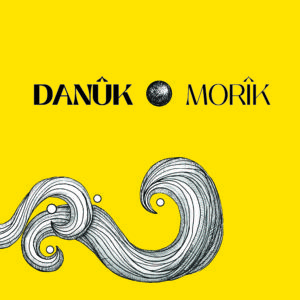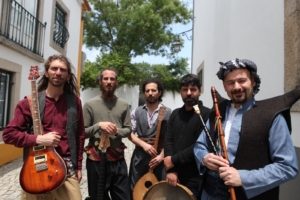Danûk: Morîk
Omni Sound
May 19, 2023
 Kurdistan is known as the largest stateless nation on Earth. This mountainous nation of roughly 40 million is currently occupied by the governments of Turkey, Iran, Iraq and Syria with several million diaspora living predominately in northern Europe. Kurdish is an Indo-Iranian language and while sometimes referred to as the western edge of what was once the Persian Empire, the Kurds have been a nomadic pastoral people living in these mountains since antiquity. Long subject to discrimination and ongoing genocide by the dominant governments of the region, the Kurds have fought to maintain their culture and language.
Kurdistan is known as the largest stateless nation on Earth. This mountainous nation of roughly 40 million is currently occupied by the governments of Turkey, Iran, Iraq and Syria with several million diaspora living predominately in northern Europe. Kurdish is an Indo-Iranian language and while sometimes referred to as the western edge of what was once the Persian Empire, the Kurds have been a nomadic pastoral people living in these mountains since antiquity. Long subject to discrimination and ongoing genocide by the dominant governments of the region, the Kurds have fought to maintain their culture and language.
Which brings us to the band Danûk. Founding members Ferhad Feyssal (Voice and Guitar) and Hozan Peyal (Buzuq) fled their home of Heseke (Arabic: Al-Hasakah) in Syrian Kurdistan in 2012 due to the Syrian Civil War. Initially settling on the Asian side of Istanbul, Turkey, they rented an old apartment with other friends, foraging for firewood and busking on the streets to survive. In 2015, they teamed up with local Kurdish musicians Gül Temiz on Mey and Faysal Macit on Daf and Darbuka along with a rotating cast of guest musicians. Here they began actively performing live, finding work in local radio and film, and posting over social media. I stumbled on a number of Danûk videos while searching for Buzuq players on YouTube and was delighted by videos ranging from the heart wrenchingly beautiful to the whimsical, reminiscent of early Beatles films.

Danûk plays a variety of Kurdish folk instruments alongside Western instruments like guitar and bass. Of the Kurdish instruments, Danûk leverages the Buzuq, a long neck member of the broader Central Asian, Near Eastern lute family with movable, microtonal frets. Wind instruments include the Mey, a double reeded shawm akin to the Armenian Duduk as well as the double reeded Zurna and the Blur, an end blown shepherds’ flute, known as Kaval across most of the Balkans and Anatolia.
Traditional percussion instruments include the specifically Kurdish frame drum Daf alongside Bendir (Frame Drum), Darbuka (Doumbek) and Dahol (Tupan). Danûk’s repertoire is deeply rooted in Kurdish dance rhythms and both traditional and contemporary folk songs. Their beautiful version of Ciwan Haco’s Zingil (The Bell) is especially moving:
More recently, Danûk members were granted residence & refugee status in the EU and are currently spread out across England, Netherlands, Germany & Spain. With support from the Arts Council England, Danûk was able to record their first commercial recording Morîk (Pearl) which was recorded by Snarky Puppy bandleader and bassist Michael League at his studio in Barcelona. The lineup still centers around Ferhad’s beautiful vocals and Hozan’s virtuosic buzuq but for this debut record, Morîk features virtuosi Syrian-Kurdish Ronas Sheikmous on Blur, Mey and Zurna and dynamic Turkish-Kurdish Tarik Aslan on Daf, Bendir Darbuka and additional percussion. The recording ensemble is augmented by occupied Golan Heights guitarist Yazan Ibrahim and Michael League on bass:
On Morîk, Danûk pulls from both contemporary Kurdish folk tradition but also features innovative arrangements of four songs learned and adapted from wax cylinder recordings made in Kurdistan in 1902 and 1912 and archived in institutions in both Berlin and Vienna. Morîk opens with Axir Zemana, originally sung by a Kurdish priest recorded in Jerusalem in 1912: “Turn your face to the sky. How green are the mountains. Look at the turning of the galaxy full of colorful stars.” This is followed by De Çêkin in 10/8 in which the bride is dressed roses and pomegranate flowers and Xelîlo Lawo, a slow, plaintive love song from the 1902 wax cylinder recordings. In Finciko, the singer extolls the beauty of his lover describing her “breasts as soft as cheese, teeth as white as grains of rice, and smelling like paradise.” Another raucous love song Şewqo follows with the band in top form and Ronas’ zurna & Tarik’ percussion leading the charge and a magnificent buzuq taksim from Hozan. Lo Lo Li Mino is another 1912 archival poetic song from a Kurdish priest “They say it is the end of time. The earth and sky will collide, and the tired galaxy is ready to fall.” The very groovy, very upbeat Girê Sîra is nothing short of epic with the term “Spaghetti Eastern” coming to mind. Lê Lê Mi Go is another archival piece from 1912 which the band set in the 10/8 (3223) curcuna dance rhythm common across Kurdistan “Your house is not destroyed; the daffodils and fig trees have blossomed”. Morîk concludes with an achingly beautiful popular love song Lo Şivano “My shepherd plays the ney (flute). He knows my heartache.”
True to its name, Morîk is a rare and genuine pearl. Danûk has uplifted from obscurity these early 20th century archival recordings and added their collective passion, love and virtuosity to this body of wonderful traditional Kurdish songs. Danûk takes their name from the traditional Kurdish cooking vessel used to prepare bulgur. The tradition of “danûk” involves the community gathering around the fire listening to stories and songs followed by a shared meal from the danûk. With Morîk, we are welcomed in to take part.
Morîk is available for download or physical CD at: https://omnisoundlabel.bandcamp.com/album/mor-k
Click for more on Kurdish Folk Music
Pat Mac Swyney is a Los Angeles based musician who plays Traditional Jazz with The SWING RIOTS Quirktette; Balkan with NEVENKA and Orkestar PEČURKA; Old-Time with SAUSAGE GRINDER; and Irish+ with The DIRTY MICKEYS.












